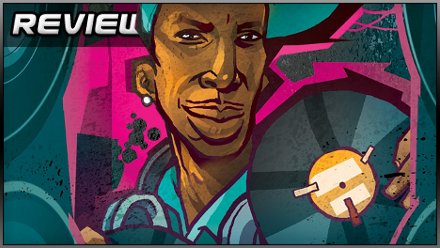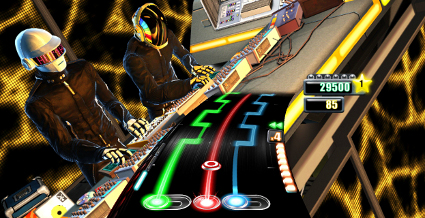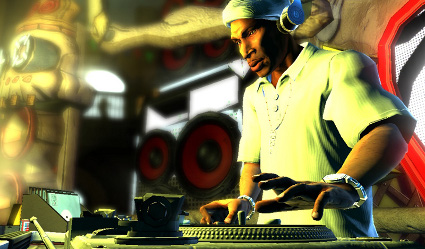In preparation for reviewing DJ Hero, I bought a pair of pink Calvin Harris-style fly-eye glasses and read a copy of Mixmag cover to cover. Really, though, I ought to have spent a little time with Amplitude. DJ Hero has far more in common with Harmonix’s early rhythm-action games than with Guitar Hero, Rock Band or anything that has come since.
It’s all about the peripheral, of course. The mini-turntable is undeniably cool. The spinning record has vinyl-like grooves in it and sparkly buts on the sides to make it look cooler when it’s spinning. There are three buttons, a crossfader that you move left and right to control the mix, an effects dial that messes with the sound or chooses your freestyle effects. It feels fantastic to play – it’s not much closer to actual DJing as Guitar Hero is to real shredding, but it really gives you the illusion of control over the music.
As notes scroll down a highway on the screen, you play by pressing the buttons, crossfading left and right or holding down a button and scratching back and forth. Arrows indicate when you have to scratch in a particular direction.
On anything below Hard, it’ll accept any movement as scratching, but on Expert you have to scratch back and forth with the same actions and rhythm as the actual mix, making the game a lot more technical. It’s impossible to actually fail a song in DJ Hero, but you can do spectacularly badly. You’re scored out of five stars, and the more stars you get, the more new setlists, decks, characters, outfits and other fun stuff you unlock.
Playing DJ Hero is a zoned-out experience. It doesn’t lend itself as well to performance Rock Band and its ilk. It’s still a party game, but instead of leaping around in front of people you’re hidden at the back, controlling the music, regarding the screen with the customary rhythm-action gamer’s thousand yard stare. Hook up DJ Hero to a big TV and a good sound system and there isn’t a more quietly thrilling music games out there. It’s a very different experience to something like Rock Band; much more precise, but just as rewarding.
The quality of the presentation strikes you immediately. The opening cutscene is polished and brilliantly surreal, the graffiti-inspired art style in the menus isn’t garish, the effects whilst you’re actually playing the game are noticeably sleek – the vinyl-like sheen of the note highway, the bright, well-animated background visuals, the great animation on each of the selectable DJs. It oozes unselfconscious cool, too, managing to pull a rave-inspired style without appearing over-the-top or gaudy. All of it suits the music perfectly, of course, which is the most important thing.








 Satoru Iwata Video Interview - the late Nintendo president spoke with Kikizo in 2004 as 'Nintendo Revolution' loomed.
Satoru Iwata Video Interview - the late Nintendo president spoke with Kikizo in 2004 as 'Nintendo Revolution' loomed. Kaz Hirai Video Interview - the first of Kikizo's interviews with the man who went on to become global head of Sony.
Kaz Hirai Video Interview - the first of Kikizo's interviews with the man who went on to become global head of Sony. Ed Fries Video Interview - one of Xbox's founders discusses an epic journey from Excel to Xbox.
Ed Fries Video Interview - one of Xbox's founders discusses an epic journey from Excel to Xbox. Yu Suzuki, the Kikizo Interview - we spend time with one of gaming's most revered creators.
Yu Suzuki, the Kikizo Interview - we spend time with one of gaming's most revered creators. Tetris - The Making of an Icon: Alexey Pajitnov and Henk Rogers reveal the fascinating story behind Tetris
Tetris - The Making of an Icon: Alexey Pajitnov and Henk Rogers reveal the fascinating story behind Tetris Rare founders, Chris and Tim Stamper - their only interview? Genuinely 'rare' sit down with founders of the legendary studio.
Rare founders, Chris and Tim Stamper - their only interview? Genuinely 'rare' sit down with founders of the legendary studio. The History of First-Person Shooters - a retrospective, from Maze War to Modern Warfare
The History of First-Person Shooters - a retrospective, from Maze War to Modern Warfare